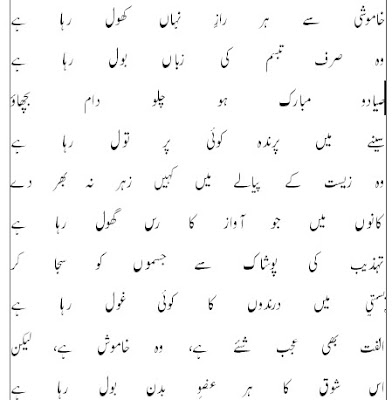A few months ago my sister, Dr. Imrana Nashtar, who was Reader in Aligarh University and now lives in the United States , informed me that a gentleman in Bhopal
and I quote:
"Sometime I don't write poetry for weeks or years at a time. And when the flow begins, whether I am in the office or traveling or just staying in one place, couplets, one after the other, start tumbling out of me. Some times, after a fallow period of years, for ten – fifteen days it seems that someone has pushed the button of creativity in me; during these days I am almost in a trance, swaying back and forth, and in that state I welcome the new arrivals. When the couplets produced by my inner self during this period leave such a remarkable impression on me, a being of modest learning, then I breathe with satisfaction that the people of taste will certainly like them."
For the reason I mentioned earlier, I try to find time in my very busy life in Washington
"WO SIRF TABASSUM KI ZABAN BOL RAHA HAI:"
In silence, he is revealing every secret
He is only speaking the language of smiles
Hunter - congratulations - get ready your trap
Your quarry of my heart is poised to fly
Though he is putting sweet melodies into the ear
Beware! He may poison the cup of your life
Attired in the robes of civilization
Packs of carnivores have been residing within the community
Love, such an unusual thing - though the beloved is silent
And yet, every limb of his speaks volumes of her emotions
- Dr. Shahzad A. Rizvi
**********************************************************
(Ghazal in roman script:
Khamoshi se har raz-e-nihan khol raha hai
Wo sirf tabussum ki zaban bol raha hai
++++++++++++++++++++++++++++
Sayyado Mubarak ho, chalo daam bichhao
Seene mein parinda koi par tol raha hai
++++++++++++++++++++++++++++
Wo zeest ke pyale mein kaheen zahr na bhar de
+++++++++++++++++++++++++++++
Ulfat bhi ajab shai hai, wo khamosh hai lekin
Us shokh ka har azw-e-badan bol raha hai
+++++++++++++++++++++++++++++
Tehzeeb ki poshak se jimson ko saja kar
Basti mein darindon ka ghol raha hai
+++++++++++++++++++++++++++
Meanings’
1. Raz-e-nihan : Deep secret
2. Daam : Net
3. Zeest : Life
4. Azw-e-badan : Part of body
5. Poshak : Attire, dress
6. Darindon : Beasts,
7. ghol : group


 hkj
hkj



